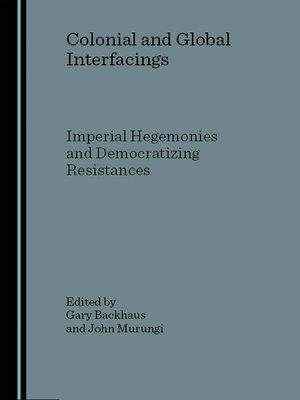Colonial and Global Interfacings
ebook ∣ Imperial Hegemonies and Democratizing Resistances
By Gary Backhaus

Sign up to save your library
With an OverDrive account, you can save your favorite libraries for at-a-glance information about availability. Find out more about OverDrive accounts.
Find this title in Libby, the library reading app by OverDrive.



Search for a digital library with this title
Title found at these libraries:
| Library Name | Distance |
|---|---|
| Loading... |
How space is owned through practices of domination that emerged through colonialism and have been sustained through capitalist social relations in a 'post-colonial' context. How Imperial power created, in Foucault's words, a 'boomerang effect' whereby the techniques developed to control and subjugate colonial subjects worked with such efficiency that they were imported back into Western societies to create new orders of control. How while new social movements such as the Zapatistas have remapped the rural and developed new ways to challenge and transform politics, Western societies have sought to reconstruct the world order through economic processes and military strategy. How the self-image of the West is shaped by its relationship with the 'Rest,' but also how the rest has found news ways of constructing identity that are now transforming the West as people, images, commodities, and meanings flow through the global economy. The cases considered cover every continent, contrast the West with the East as well as the global North with the global South, and prompt us to take history seriously in the construction of the present. Addressing the current buzzwords that have spread from geography across the social sciences and the humanities, this book will appeal to researchers and practitioners fascinated by the connections between cultural representation, power, spatiality, and how the ways we have been thinking about the world are open to question.







